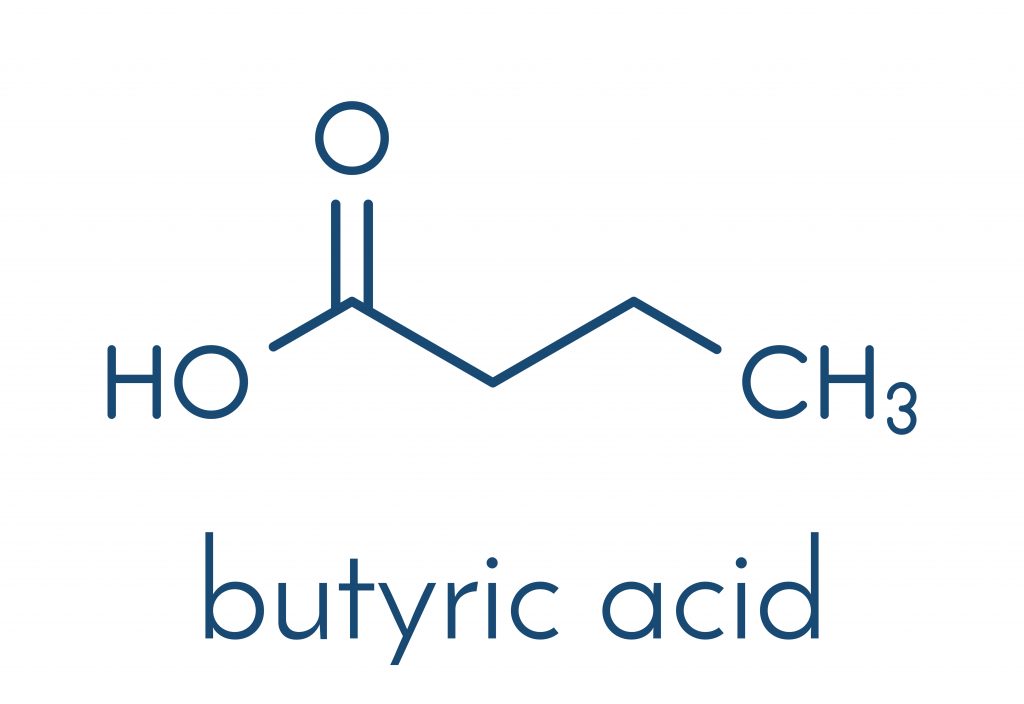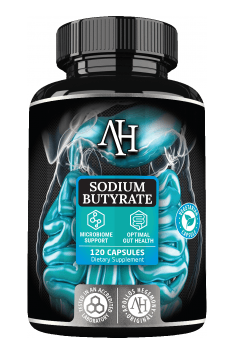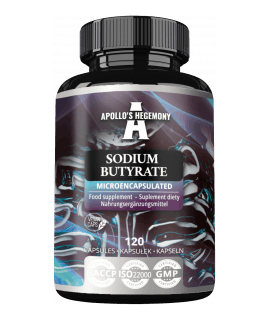Butyric acid, or sodium butyrate, has gained popularity in recent years not because of fashion, which often spoils the world of supplements and dietetics, but because of the prevalence of gastrointestinal diseases. It has been successfully used to treat not only unwanted symptoms, but more importantly to support treatment of the underlying causes of digestive dysfunction.
- What is sodium butyrate?
- Mechanism of action of sodium butyrate
- Dietary sources of sodium butyrate
- Health benefits of sodium butyrate
- The digestive system and sodium butyrate
- Sodium Butyrate and IBS
- Sodium butyrate and ulcerative colitis
- Sodium butyrate and Crohn's disease
- Sodium butyrate and colorectal cancer prevention
- Sodium butyrate and weight loss
- Sodium butyrate and the nervous system
- What to combine sodium butyrate with?
- How much sodium butyrate to take?
- How should I use sodium butyrate?
- Side effects of sodium butyrate
- Sodium butyrate supplementation and irritable bowel syndrome (IBS)
- Sodium Butyrate and Weight Loss
- Summary
What is sodium butyrate?
Butyrate (butyric acid) is a short-chain fatty acid that contains 4 carbon atoms, including a carboxyl group. As the name suggests, fatty acids are the building blocks of fats, which our cells need to function properly. Butyrate is synthesized in our intestines when bacteria in the intestinal wall ferment indigestible fiber from foods rich in complex carbohydrates.
Butyrate is the preferred energy source for colon wall cells. It is essential for maintaining a healthy, impenetrable barrier between the colon and the bloodstream and prevents inflammation of the intestine.
Butyrate production depends largely on the pH of the colon. Bacteria that produce butyrate prefer a more acidic environment (that is, one with a lower pH), while bacteria that produce other short-chain fatty acids, such as acetate and propionate, prefer a more alkaline environment (that is, one with a higher pH).
Sodium butyrate itself is a salt formed from the combination of butyric acid and sodium, which is the stable form of butyrate most commonly used in dietary supplements to support gut health.
Mechanism of action of sodium butyrate
Butyrate inhibits the activity of histone deacetylase (HDAC), an enzyme that packs DNA molecules into tight, compact structures and prevents its expression. In other words, butyrate loosens the structure of DNA and thereby increases gene expression.
HDAC-inhibiting drugs are currently used to treat bipolar disorder and prevent epileptic seizures. Early studies suggest that they may also be effective antidepressants.
The link between butyrate and HDACs helps explain why our gut flora has such a big impact on our mental health. And in fact, people with major depressive disorder according to research have significantly less butyrate synthesizing bacteria in their gut than healthy people.
Dietary sources of sodium butyrate
Butyrate can be provided directly from dietary sources to some extent. For example, dairy products, especially butter (as the substance's name suggests), are rich in butyric acid.
Butter, which is such a rich source of this acid that it takes its name from it, contains about 3 to 4% butyrate in the form of tributyrin. Vegetable oils also contain some of butyric acid.
Consuming more fiber increases the production of butyrate by certain bacteria in the gut. In general, there is an association between higher intake of plant foods and increased levels of short-chain fatty acids (SCFAs), including butyrate, synthesized within the digestive system.
However, not all plant-based foods cause increased levels of butyrate in the body. For example, a diet high in fruit or starch is associated with high levels of intestinal butyrate, but for example wheat bran, which is naturally low in starch, does not increase intestinal butyrate synthesis.

Depending on the composition of your gut flora, the following food items may activate SFCA-producing cells, including butyrate:
- Inulin-rich foods: artichokes, garlic, leek, onions, and asparagus
- Foods rich in fructooligosaccharides (FOS): fruits and vegetables, including bananas, onions, garlic, and asparagus
- Products rich in resistant starch: cooked and cooled rice, potatoes and green bananas
- Products rich in pectin: apples, apricots, carrots, and oranges
- Oat bran
- Arabinoxylan
- Guar gum
- Arabinogalactan
- Flours made from cornstarch or potato starch,
Health benefits of sodium butyrate
The main health benefits of sodium butyrate include:
- Providing energy for colon cells
- Prevention of cancer of the colon
- Increasing mitochondrial activity
- Preventing toxins from passing through the intestinal barrier
- Improving insulin sensitivity
- Promoting a healthy weight
- Fighting inflammation
- Preventing the growth of pathogenic bacteria
- Protecting the nervous system
The digestive system and sodium butyrate
The digestive system is where food is broken down, nutrients are absorbed, immunity is created and maintained, and vitamins and energy are created for the gut so it can perform its functions. Butyric acid is one of the short chain fatty acids (SCFAs) and is the primary source of energy for intestinal epithelial cells. Pure butyric acid is not pleasant to smell, but it is present in our body, as evidenced by its presence in the returned gastrointestinal tract during vomiting, as well as in numerous studies on the composition of the intestinal environment. The most important information is that butyric acid can be:
- produced by the body,
- supplied through food in small amounts (e.g. from meat fat, fatty dairy products),
- supplemented in capsule form.
The production of butyric acid in the body is due to the presence of bacterial flora, which in the process of fermentation uses the fiber we consume. Fiber is found mainly in legumes (peas, beans, soybeans, peas, chickpeas, lentils, etc.), nuts, cereal products, whole grains, and most importantly, vegetables and fruits. It is noted that a high-fiber diet reduces the risk of colon cancer and it is the beneficial production of butyric acid which, among other things, contributes to this.
Butyric acid, which is found in animal products (animal fat, dairy) is a good source, however, it should be remembered that animal fats are rich in saturated fatty acids, which according to the latest dietary recommendations should be consumed in the smallest amount possible in a balanced diet.
The last source of sodium butyrate are supplements, which went through a lot of research before it found its use so that it could perform its function. Sodium butyrate is metabolized quite rapidly in the stomach and in the initial part of the small intestine, so it took a long time to develop a capsule that could reach intact the jejunum, ileum and colon, among others. In the end, it was encapsulated in a resistant capsule, which significantly reduced the unpleasant odor of the substance and thanks to this, many people can benefit from its properties without any hindrance.
Most scientific studies on the benefits of butyric acid focus on the digestive tract. Studies have shown that butyric acid can have a positive effect on patients with functional and inflammatory bowel disorders. However, it turns out that this is not the only research focus, and it is likely to cover many aspects of health in the future.
Sodium Butyrate and IBS
IBS, or irritable bowel syndrome, can be characterized by a variety of symptoms ranging from constipation, to diarrhea, bloating, and abdominal pain. Research is still ongoing, but several studies have already been done on the validity of the use of butyric acid. It has been noted that taking butyric acid may lead to a reduction in abdominal pain during bowel movements and normalization of bowel movements in people with IBS. The study involved 66 people, 34 of whom received sodium butyrate at a dose of 300 mg (2 times 150 mg per day) and the rest a placebo during ongoing standard therapy for the treatment of IBS. Positive effects were noted after only 4 weeks. Another study involving 113 people found that the number of bacteria responsible for the production of butyric acid in the intestines of people with IBS is too low, which raises the need for further research on supplementation. The exact mechanism is still unclear. It is also interesting to note that the presence of butyric acid in the gut may inhibit the growth of unwanted bacteria that negatively affect gut function, and this may be a reason for the reduction of IBS symptoms. Butyric acid may also improve water absorption in the intestines, which is important for patients who suffer from diarrhea.

Sodium butyrate and ulcerative colitis
UC is one of the inflammatory bowel diseases in which impaired production of butyric acid is noted, which may be one of the causes of adverse changes in the colonic mucosa. The impaired production is mainly due to impaired oxidation of butyrate, and sodium butyrate supplementation may be a partial solution to this problem. Delivery of butyrate to the intestines in an exogenous manner (capsules, infusions) allows to partially overcome the insufficiency of the oxidation process. Thus, it is noted that in patients with UC the administration of butyrate improves the condition of the intestinal mucosa in both clinical, endoscopic and histopathological examination. This disease is also associated with an imbalance of elements in the body, including high levels of chloride and sodium. In an animal study, it was noted that supplementation with sodium butyrate increases the chance of restoring their proper levels.
Sodium butyrate and Crohn's disease
Crohn's disease, along with UC, is one inflammatory bowel disease in which the possible potential of sodium butyrate supplementation has been seen. In both diseases, one must be quite cautious about a definitive assessment of efficacy, as there is as yet no meta-analysis and no hard evidence. However, it is speculated that in both diseases there is a deficiency of sodium butyrate in the gastrointestinal tract. This is tentatively supported by several studies, including a clinical trial with children suffering from Crohn's, but it is not enough information to claim that sodium butyrate effectively and sufficiently reduces inflammatory bowel disease. Nevertheless, another point is promising. This is because sodium butyrate increases levels of glutathione, which is a powerful antioxidant. We also know that glutathione has the ability to protect against oxidative damage, which can potentiate inflammation in the gut.
Sodium butyrate and colorectal cancer prevention
One of the interesting pieces of information that has emerged in the medical community is that sodium butyrate may reduce the risk of colorectal cancer and it is claimed that it should be a part of treatment for those affected by cancer. For now, this claim is being treated with caution; however, biochemists recognize that butyric acid may inhibit the growth and proliferation of colon cancer cells, as well as lead cancer cells to apoptosis. There are no meta-analyses to date, but isolated studies support the anti-cancer effects of butyric acid.
Sodium butyrate and weight loss
The importance of many substances in the potential impact on weight loss is still being researched. In the case of sodium butyrate, the potential benefits are similarly being explored, and although research is still mainly in rodents, it is already being reported that supplementation with sodium butyrate may be indicated in people with metabolic diseases, obesity and diabetes. For example, it has been studied whether sodium butyrate can improve insulin sensitivity and energy expenditure in mice. The hypothesis was confirmed and in addition, improved mitochondrial function was noted. In contrast, another study suggests that the use of sodium butyrate can reduce the levels of the hormone responsible for generating appetite. You cannot call the substance a weight loss agent, but this is information worth further research, because not only the regulation of hormones, but also appetite control plays an important role in the process of fat reduction.
Sodium butyrate and the nervous system
The gut microbiome has an impact on nervous system function, and since butyric acid has a positive effect on the gut, there's a chance that the nervous system may be supported by sodium butyrate as well. In 2016, it was recognized that the supplement may be helpful in treating neurological diseases. The protective effect of butyrate on nerve cells especially in Parkinson's disease is considered.
What to combine sodium butyrate with?
Sodium butyrate is being studied for synergistic effects with other anti-cancer substances. For example, its combination with nicotinamide and calcium glucarate prevented epidermal tumor formation in mice.
In leukemia cells, the combination of sodium butyrate and the plant-derived compound artemisinin was very effective in killing cancer cells, even at low doses.
Some researchers have proposed combining sodium butyrate and interleukin-2 (IL-2), a cytokine that activates NK cells along with butyrate. According to a study on rats, this combination helps the immune system carry out a more precise response against cancer cells.
How much sodium butyrate to take?
The typical dose of sodium butyrate used in studies is 150-300 mg/day, and this is the most commonly recommended dosage of currently available products containing it.
However, determining the optimal dose of supplementation is not easy, and the results of past studies focusing on this issue are often highly inconclusive. High viscosity of intestinal contents, presence of bacterial biofilm, non-uniform mucus layer on the surface of intestinal mucosa and rapid absorption of short-chain fatty acids make it difficult to determine their concentration on the mucosal surface itself. On the other hand, the concentration of short-chain fatty acids in the intestinal lumen or fecal matter does not reflect the rate of their production.
All of these factors make it difficult to determine a supplementation dose that would maintain optimal levels of butyrate in our digestive tract, given the butyrate already produced in our bodies. Thus, supplementation suggests taking a dose of about 300 milligrams per day per day to minimize the risk of butyrate deficiency.
How should I use sodium butyrate?
Sodium Butyrate is best taken with one of the main meals of the day, preferably breakfast or dinner.
The daily dose of butyrate can then be split into 2 servings (one half an hour after breakfast, the other half an hour after dinner), or the full dose can be taken half an hour after either of these meals.
Side effects of sodium butyrate
In studies in which doses of 300 milligrams or less per day were used, researchers reported no side effects. However, studies examining the possible toxicity and side effects of sodium butyrate are still to come, so it is wise to be cautious when using higher doses.
However, if you are pregnant or breastfeeding, it may be safer for you to avoid sodium butyrate supplementation. One animal study showed that giving sodium butyrate to pregnant and lactating rats led to the induction of insulin resistance and increased fat storage in the offspring.
Sodium butyrate supplementation and irritable bowel syndrome (IBS)
One of the primary purposes of sodium butyrate supplementation, is to support the condition of the digestive system, for specific medical conditions. The most common gastrointestinal condition is Irritable Bowel Syndrome (IBS).
In a study examining the direct effects of sodium butyrate on the well-being of IBS patients, a 12-week supplementation of 300 milligrams of sodium butyrate reduced abdominal pain and improved overall well-being for most subjects.
For this reason, it is often suggested to start butyrate supplementation when struggling with this intestinal disease.
Sodium Butyrate and Weight Loss
It turns out that Sodium Butyrate doesn't have to be used exclusively by those struggling with digestive irregularities. It turns out that people with more common problems can also benefit from its supplementation - for example, sodium butyrate can be used for overweight.
For example, people who are overweight very often have intestinal dysbiosis, causing improper digestion, and thus metabolism of ingested food. Sodium butyrate, can counteract dysbiosis by creating a proper balance of intestinal microflora that will increase the effectiveness of our weight loss.
Summary
Sodium butyrate needs further research, but we can already see that it shows beneficial effects not only on gut health, but also during related diseases (Crohn's, UC), prevention (cancer), but also in terms of metabolic health and proper brain function. Most benefits, which are already indisputable, are seen in improving gut health. The optimal dosage of sodium butyrate for prevention is still unknown, but studies have used dosages in the range of 150-300 mg and have shown effective improvement in people with compromised gastrointestinal function. However, the dosage should be consulted with a specialist. The need for systematic supplementation is emphasized, so a single intake of sodium butyrate will not produce the desired results.







